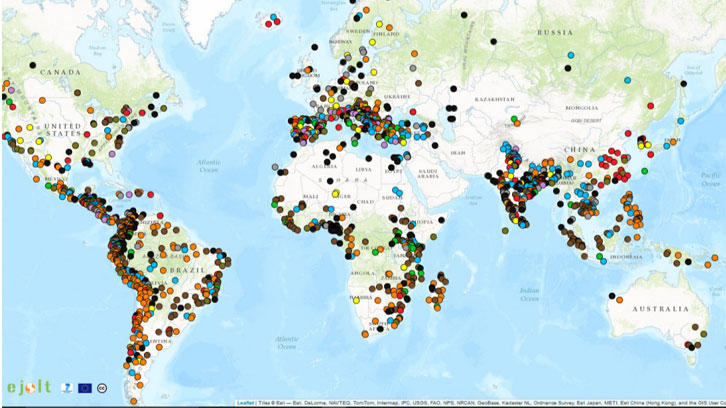Is There a Global Environmental Justice Movement?

One of the causes of the increasing number of ecological distribution conflicts around the world is the changing metabolism of the economy in terms of growing flows of energy and materials. There are conflicts on resource extraction, transport, and waste disposal. Therefore, there are many local complaints, as shown in the Atlas of Environmental Justice (EJAtlas) and other inventories.
And not only complaints, there are also many successful examples of stopping projects and developing alternatives, testifying to the existence of a rural and urban global movement for environmental justice.
Moreover, since the 1980s and 1990s, this movement developed a set of concepts and campaign slogans to describe and intervene in such conflicts. They include environmental racism, popular epidemiology, the environmentalism of the poor and the indigenous, biopiracy, tree plantations are not forests, the ecological debt, climate justice, food sovereignty, land grabbing, water justice, among other concepts.
These terms were born from socio-environmental activism but sometimes they have been taken up also by academic political ecologists and ecological economists who, on their part, have contributed other concepts to the global environmental justice movement, e.g. ‘ecologically unequal exchange’ or the ‘ecological footprint’.
This article derives from the ICTA-UAB European project “EJOLT, 2011-2015 (Environmental Justice Organizations, Liabilities and Trade)” and is a contribution to two new ICTA-UAB projects: “ACKNOWL-EJ, 2016-29”, funded by the ISSC (International Social Sciences Council), directed by Leah Temper, and “EnvJustice (2016-2021)”, funded by an ERC Advanced Grant to Joan Martinez Alier. All this will expand EJAtlas to 3,000 socio-environmental conflicts around the world, around the year 2019, and perform many studies on comparative, statistical political ecology.
Joan Martinez-Alier
Institute of Environmental Science and Technology (ICTA)
arnim.scheidel@gmail.com, joanmartinezalier@gmail.com
References
Martinez-Alier, Joan; Temper, Leah; Del Bene, Daniela; Scheidel, Arnim. Is there a global environmental justice movement? The Journal of Peasant Studies. 2016, vol. 43, num. 3, p. 731-755. doi: 10.1080/03066150.2016.1141198.


